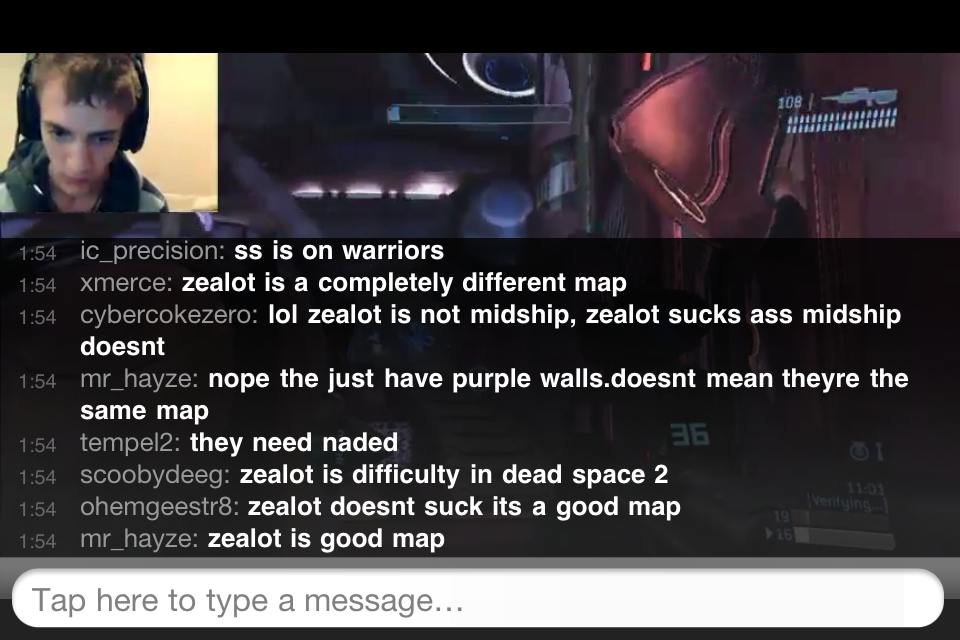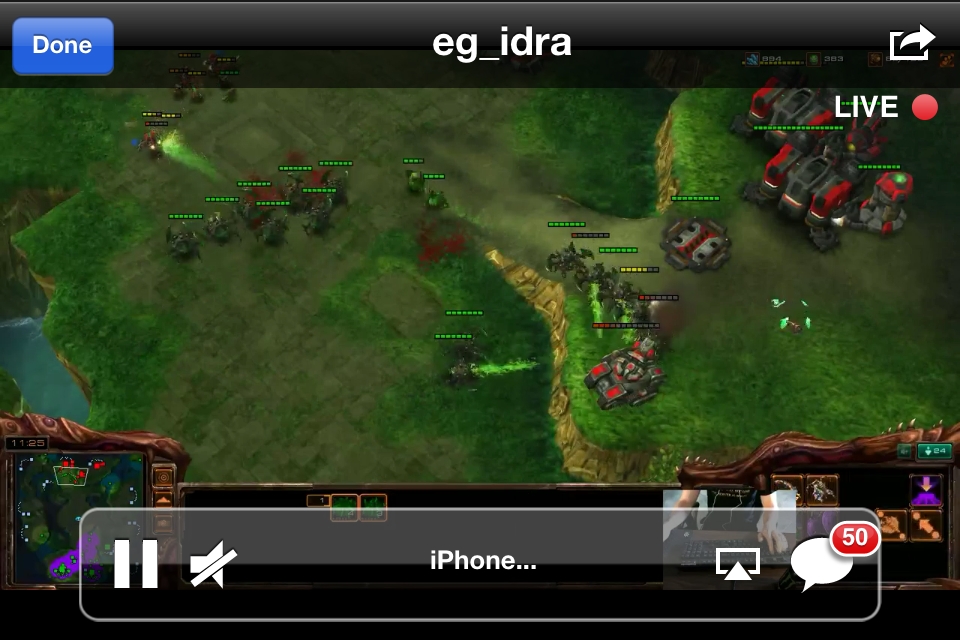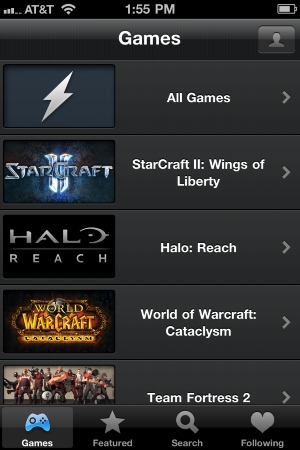Gaming content is a hugely popular thing online, as evidenced by the amount of gaming websites out there. Equally popular is video content for games, resulting in tens of thousands of new videos on sites like YouTube every single day. Live video streams are also becoming important and popujuslar, especially for eSports, and are also a great way for gaming sites to promote themselves. TwitchTV is increasingly a resource for streaming game videos and both boosts and has been boosted by the demand for gaming video content from around the world. We talked with Justin Kan (President, Justin.tv) and Matthew DiPietro (VP Marketing, TwitchTV) about the growth of streaming video.
[a]list: Give us a little background on the origins of TwitchTV and Justin.tv.
Justin Kan: We started Justin.tv about five years ago. It started out as a bunch of different things; we tried a web reality TV show, but in talking to a lot of our viewers, they said they wanted to create their own content so we made a platform for live video. Right now, the site is reaching 30 million people every month. About a year ago, we started looking at different things internally, including gaming. We noticed on Justin.tv people were broadcasting their video game sessions. We didn’t get it at first, but a small team started working on growing the community. Gaming started growing and after we started working on it, we’ve seen 10 percent traffic growth every month. We decided in May that gaming had grown to the point where deserved its own brand.
Matthew DiPietro: Another element of the re-branding is launching a series of features that make sense for the gaming community. The features and functionality are different enough that it needed to be its own thing.
[a]list: How do you feel the iPhone app will expand your company’s eSports and other offerings?
Justin Kan: People want to watch the content everywhere, we asked them where they wanted to get TwitchTV content and iOS was the most requested. We have a Justin.tv app that has 5 million downloads, but with a TwitchTV App we wanted something specifically for viewing gaming content, able to do things like sorting by what game people are playing.
Matthew DiPietro: We have some experience launching this stuff too, and if the Justin.tv app is any indication, we expect [the TwitchTV] app to be adopted quickly. 10 percent of those watching TwitchTV are from mobile and it stands to reason many are jumping from mobile to PC when they get home.
Our idea for the app’s feature list is to bring the web experience to the mobile device. The ability to search, watch and chat in the app with other people watching the stream is pretty unique.

[a]list: Talk to me about some of your future app plans.
Justin Kan: We want to be everywhere the viewers want us to be. Our second most requested platform is Android, we have a Justin.tv Android app, but we’re making a specific TwitchTV app.
Matthew DiPietro: I’ve seen early version of the iPad app and it is amazing.
[a]list: Talk to me about the growth in the number of users TwitchTV has experienced and what you think caused it.
Justin Kan: We’ve grown pretty significantly for several reasons. We can’t take all the credit for it – gaming video is expanding massively and it’s becoming something people are more used to. There’s 173 million gamers in the U.S. and they’re looking for more video content and millennials are making more and more videos and spend their time watching other content.
Also, We spent a lot of time iterating the site based on what users want, so our modus operandi is finding out what features they and the broadcasters want and building it and find out if it works well for them, and I think that’s really resonated with the companies and created a product for the live-stream that gamers want to use.
[a]list: What sort of audience do you have on TwitchTV? Do you draw from all over the world?
Justin Kan: 40 percent is in the U.S.; the rest of international. Western Europe is the biggest territory outside of the U.S., and there’s a little bit in Eastern Europe and Asia, which is mostly Japan and Taiwan but right now we’re building up stuff primarily for the U.S. but it’s a very global thing. People that are competing with games in the U.S., those same games are popular in in Europe and Asia as well.
[a]list: What are some of your biggest games on the site?
Justin Kan: StarCraft II is really big. I’m a fan myself and I spend about 10 hours watching that every week. League of Legends is popular as is Heroes of Newerth; the whole “MOBA” genre gets a lot of play. There are shooter titles like the newly released Battlefield 3 and Halo: Reach. Some people like fighting games, like Super Street Fighter IV and Marvel vs. Capcom 3. Minecraft is big, so is World of Warcraft and people will play retro games as well.
When big titles come out, there are shows we have on TwitchTV that will do a variety of things to cover them. There’s a community of people who like playing through the games while others commentate; that’s popular on TwitchTV.

[a]list: That’s been a growing phenomenon, this use of “sidecar” commentary on games, bringing back the aspect of shared, “single-player” experiences.
Justin Kan: It’s like watching over your friends shoulder while he plays and that’s been lost as people are playing more online and using mobile devices and it’s good to bring that back.
[a]list: What are some upcoming events you have planned for TwitchTV?
Justin Kan: We partner with big organizations to carry their tournaments were showing the Dreamhack LAN party and the MLG finals, and we just broadcast the IGN Pro Leagues in Caesar’s Palace; we don’t produce things ourselves, we just bring it to a large audience.
[a]list: I understand that you have to educate some gaming sites that you’re here to help them, not compete with them.
Justin Kan: We work with IGN on the editorial side and their eSports division, we partner with MLG to show their streams from their weekly broadcasts and carry their events and recently signed a deal with ESL, a big pro-gamer league in Europe. We also do the Intel Extreme Masters where we broadcast from the New York Comic Con.
Matthew DiPietro: We’ve partnered with some big pro-gamer teams like Team Liquid along with tournaments and organizations and we’ve been fortunate to ally ourselves with the world’s best. For instance, Destructoid also produces content on our site.
Justin Kan: What we want to do is provide a platform for other content producers. We don’t produce content ourselves, our goal is to be a platform for the content and a community site. They’re creating their own content and they’re running commercials and hopefully they can make a business out of it.
[a]list: What sort of sponsorships do you get from TwitchTV?
Justin Kan: The site is largely ad supported and we share pre-roll video ads with our content providers. We have this innovation call “commercials” for the streaming videos. Broadcasters can trigger commercials in their broadcasts. For instance, commercials can be planned between games in matchmaking for StarCraft II.
They make money and it’s a model good for content providers and it’s a way that gamers can support these videos online and it’s not intrusive.
Matthew DiPietro: And that’s part of a well defined partner program. It’s on our website {link no longer active}, we have many hundreds of partners, many of which are doing very well for themselves.

[a]list: It seems like there’s been a real correlation between the rise of streaming video on the web and professional gaming.
Justin Kan: There’s major difference between traditional TV and us. A few years ago [pro gaming] turned into a bubble thing; it got buzz and died down because the TV distribution didn’t work well because it’s digital content that belongs online. It doesn’t work on TV because it’s meant for our medium because that’s the way the content is created.
As far as we’re concerned the, final piece of the puzzle was getting the right distribution platform and hopefully we’ll make it launch for real to go forward like traditional sports and entertainment.
[a]list: What are the ways you monetize TwitchTV?
Justin Kan: A couple [of content providers] sell subscriptions, like a StarCraft commentator that gives users a special badge recognition in chat and lets them play against him. There’s also NASL that lets you preview theircontent, but they do broadcast with higher quality streams that you can pay for and we power that PPV platform.
[a]list: Anything you’d like to add about TwitchTV?
Matthew DiPietro: We’re 40 people strong now moved in a new office space in San Francisco and we are confident in the way the industry is going!
[a]list: Justin, Matt, thanks.
_ _
Interested in streaming video? Checked out TwitchTV? Join the discussion on Facebook.

